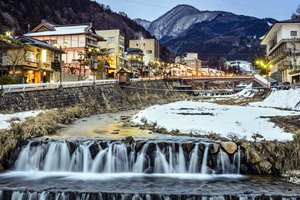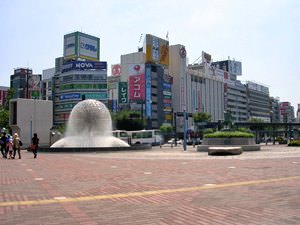
Japan is a country with a constitutional monarchy. The head of state is the Emperor, but his functions are more ceremonial than legislative. The Emperor is obliged to attend various official events. He is the guarantor of national unity and integrity of the state. He personifies the unity of the nation, but in legal terms, the Emperor has virtually no rights to solve important state issues. Despite this, without the official signature of the Emperor, any official document that was established by decisions of the cabinet of ministers or other high-ranking officials cannot enter into force. The legislation in Japan is based on the Constitution of the country, which was adopted in May 1947. It has never been amended to this day. The Constitution stipulates that in order to introduce any changes in the parliament, 2/3 of all deputies must vote “in favor”. In addition, any amendment to the Constitution may be made after the approval of the people in a referendum.
All the amenities for a comfortable stay with children have been created in Japan. Stairs of buildings are equipped with approach ramps for baby …
Read further
The main legislative body is the Japanese parliament. It has a bicameral structure. The upper house is called the “assembly of advisers”, and the lower chamber is called the “assembly of representatives”. The upper chamber is made up of more than 250 deputies. The service life of each official in parliament is 6 years. The lower house on the other hand, has more than 500 deputies, with about two hundred officials getting into office thanks to the proportional open voting system, which is held in 11 constituencies. Initially, bills are adopted in the so-called parliamentary committee. If the committee approves the bill, then the whole chamber will vote. If the bill was passed in the Lower House, then it is sent to the officials of the upper house to vote on.
The Executive power is in the hands of the Prime Minister, as well as his cabinet of ministers (consisting of 20 ministries). It is the Prime Minister and his team who is responsible for the domestic and foreign policy of the country. It should be noted that it is the deputies who previously passed special exams and confirmed their competence, that get into the Ministry. According to the country’s Constitution, influence is divided between the different parties. One of the oldest parties is the LDP, which was established in the year 1955. At that moment, the liberals and the democrats have decided to act together and their parties merged. Over time, various conflicts flared up within the party, after which the deputies left to create their own separate parties. As a result, for example, the Japan New Party and the Japan Innovation Party appeared. To date, voters have given more authority to the Liberal Democratic Party. Copyright www.orangesmile.com
A trip to the special and mysterious Japan can be not only interesting, but also useful. In addition to exploring the monuments of ancient culture, …
Read further
Japan is divided into 47 so-called prefectures. Local government in the country has fairly great powers. At the head of each prefecture is an assembly, which includes several dozen deputies, depending on the number of an administrative district. There are similar assemblies in smaller territorial units, in cities, villages and provinces. The head of the prefecture is the governor, the head of the city is the mayor, and in the villages the so-called chiefs are elected. It should be noted that the term of office is 4 years. Officials get to their post by open universal suffrage of a specific territorial unit. Citizens of the country who have already reached the age of 20, and live in the district in question for more than 3 months, have the right to vote. The financial system of territorial units is aimed at centralization, therefore less than 30% of the total annual income remains within each prefecture. On this occasion, the country regularly undergoes unrest, but at the moment there is no question of introducing decentralization. Without a doubt, there are still subsidized regions in Japan, which based on domestic taxes will not be able to survive.
![Portal at Okayama station Portal at Okayama station]()
According to the current Constitution of Japan, there must be a judicial authority in the country. It is headed by the Supreme Court. The chief judge is appointed personally by the Emperor. In addition, Japan has regional courts, district and local courts. It should be noted that the Constitution of the country stipulates a ban on the presence of internal armed forces. However, after the American occupation, the country was forced to create national police reserves, which eventually reorganized into the so-called Japan Self-Defense Forces. Today in the country, there are ground forces, airborne troops, and Navy officials. The forces are backed up by military equipment. In the last century, Japan and the United States signed a treaty under which America guarantees the provision of Japanese with defense in the case of a threat. In return, American military structures can be based in Japan.
 Japan is a country with a constitutional monarchy. The head of state is the Emperor, but his functions are more ceremonial than legislative. The Emperor is obliged to attend various official events. He is the guarantor of national unity and integrity of the state. He personifies the unity of the nation, but in legal terms, the Emperor has virtually no rights to solve important state issues. Despite this, without the official signature of the Emperor, any official document that was established by decisions of the cabinet of ministers or other high-ranking officials cannot enter into force. The legislation in Japan is based on the Constitution of the country, which was adopted in May 1947. It has never been amended to this day. The Constitution stipulates that in order to introduce any changes in the parliament, 2/3 of all deputies must vote “in favor”. In addition, any amendment to the Constitution may be made after the approval of the people in a referendum.
Japan is a country with a constitutional monarchy. The head of state is the Emperor, but his functions are more ceremonial than legislative. The Emperor is obliged to attend various official events. He is the guarantor of national unity and integrity of the state. He personifies the unity of the nation, but in legal terms, the Emperor has virtually no rights to solve important state issues. Despite this, without the official signature of the Emperor, any official document that was established by decisions of the cabinet of ministers or other high-ranking officials cannot enter into force. The legislation in Japan is based on the Constitution of the country, which was adopted in May 1947. It has never been amended to this day. The Constitution stipulates that in order to introduce any changes in the parliament, 2/3 of all deputies must vote “in favor”. In addition, any amendment to the Constitution may be made after the approval of the people in a referendum.
 According to the current Constitution of Japan, there must be a judicial authority in the country. It is headed by the Supreme Court. The chief judge is appointed personally by the Emperor. In addition, Japan has regional courts, district and local courts. It should be noted that the Constitution of the country stipulates a ban on the presence of internal armed forces. However, after the American occupation, the country was forced to create national police reserves, which eventually reorganized into the so-called Japan Self-Defense Forces. Today in the country, there are ground forces, airborne troops, and Navy officials. The forces are backed up by military equipment. In the last century, Japan and the United States signed a treaty under which America guarantees the provision of Japanese with defense in the case of a threat. In return, American military structures can be based in Japan.
According to the current Constitution of Japan, there must be a judicial authority in the country. It is headed by the Supreme Court. The chief judge is appointed personally by the Emperor. In addition, Japan has regional courts, district and local courts. It should be noted that the Constitution of the country stipulates a ban on the presence of internal armed forces. However, after the American occupation, the country was forced to create national police reserves, which eventually reorganized into the so-called Japan Self-Defense Forces. Today in the country, there are ground forces, airborne troops, and Navy officials. The forces are backed up by military equipment. In the last century, Japan and the United States signed a treaty under which America guarantees the provision of Japanese with defense in the case of a threat. In return, American military structures can be based in Japan. 


